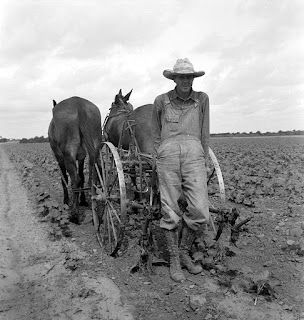Non-Monetary Theory of the Cause of the Great Depression and Its Demise

"Ex- tenant farmer turned day laborer, 1930s." This image shows the gritty poverty of farmers who had to leave their profession and take lower-paying jobs during and after the Great Depression. "Dust Bowl Farmers During the Depression." This image shows a group of unemployed farmers waiting for jobs during the Great Depression. Going from an independent, busy farmer to the boredom and tedium of constant poverty without work must have been beyond difficult. Introduction There are many theories as to the main causes leading into the Great Depression. For this blog post discussion, I am examining one of the non-monetary theories of the cause of the Great Depression and correlating information. Additionally, I will be examining the New Deal's role, led by a strong American President and a strong Congress, in helping the economy recover from the Great Depression. The non-monetary theories about the origins of the Great Depression diverge from the traditional
